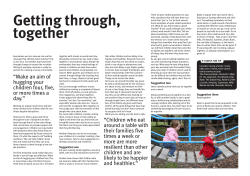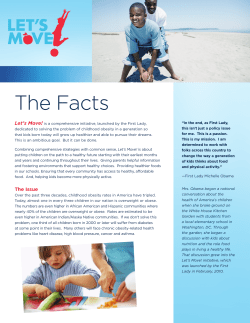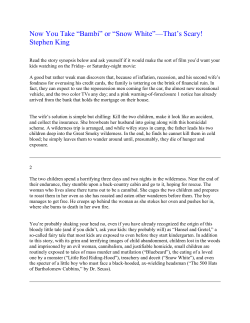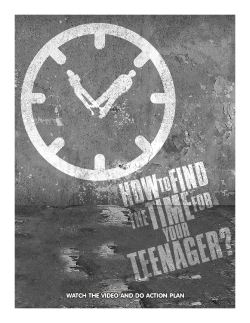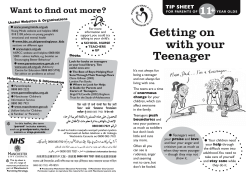
How to Cope With Crises and Teenagers’ Grief
July 2009 How to Cope With Crises and Teenagers’ Grief No matter how hard we try to protect our teenagers, they’re bound to face some hardships and sorrows. Unfortunately, kids aren’t immune to pain and tragedy. Some of the tough times of adolescence are quite common (broken relationships, not making a team, failing a test), but they still can seem devastating for teenagers. Other times, life really throws your kids a curve. Friends die in a car accident. A classmate commits suicide. Your family faces a death, divorce, natural disaster, or other major upheaval. Some of the best impact you can have on kids’ lives is during crisis situations. That’s when kids need a prepared, focused, engaged, and loving ally. That’s also when they’re powerfully open to God’s healing touch. God is love, and he can’t keep himself from moving redemptively into traumatic experiences that land like a bomb in kids’ lives. Through God’s grace, families often discover strengths, resilience, and courage that wouldn’t have surfaced otherwise. As a parent, you have the opportunity to be a safe haven during life’s storms. Allow kids to tell and retell their stories and share their feelings. Give them space to talk about their doubts and questions about God. Use crises to develop in your teenagers eyes full of compassion (see Matthew 9:35-38). And offer hope that God will turn tragedy into something beautiful, according to his will. This issue of “The Parent Link” offers insights and general strategies you can use. For help with specific crises, check out Group’s Emergency Response Handbook for Parents, available from www.group.com. Psychology professor and author Les Parrott III offers these steps to help you handle your next challenging situation: 1. Accept the crisis. We’re often tempted to play down another person’s problem to ease our own anxiety. Instead of talking teenagers out of their pain, acknowledge it. 2. Gather information carefully. It’s dangerous to jump to a hasty conclusion before you have all the facts. There may be more to the crisis than you’re hearing. 3. Be present. Listen and communicate a willingness to give the time required. Being with a caring person who’s fully present renews energy and hope in a young soul. 4. Help make God’s presence known. Without spiritualizing and giving simplistic answers, reassure kids that God will help them through tough times. The Psalms are an especially effective bridge back to God. 5. Determine an immediate action plan. Identify the problem and the desired outcome. Then think about who is best equipped to help your teenager through the crisis. Also mobilize social support. Chances are that your teenager has already experienced profound grief. By the end of high school, 20% of students will have experienced the death of one parent, and 90% will have lost a close relative or loved one. Before their 18th birthday, half of all kids will experience the divorce of their parents. Experts say divorce negatively impacts some kids more than a parent’s death does. Each year, one in every 1,500 high school students dies. Car crashes are the top killer of teenagers. Every year, 5,000 U.S. teenagers die in car crashes. Great Questions to Ask Your Kids Help teenagers open up during tough times with these discussion starters: 1. Why does suffering occur? Does God allow it? Could he prevent or stop it? Explain. 2. Why do Christians face as many (or more) troubles as nonChristians? Are troubles meant to test our faith? 3. How would you respond to a hurting friend who feels abandoned by God? Is it possible to grow closer to God during the worst of times? Explain. 4. What are some of the toughest things you’ve faced, and how have they affected and changed you? PRAY THAT: 1. God will prepare your teenagers and your family spiritually for times of upheaval and uncertainty. 2. God will provide comfort and peace for your teenagers when grief turns their lives upside-down. 3. You will always be receptive to listening to your kids and will demonstrate Christlike acceptance when they’re hurting. 4. During tragedies, God will transform lives and be glorified. Verse of the month “The Lord is close to the brokenhearted; he rescues those whose spirits are crushed. The righteous person faces many troubles, but the Lord comes to the rescue each time.” (Psalm 34:18-19) In the Old Testament, Satan targeted Job for attack because Job was a God-fearing man. Satan was certain he could cause Job to curse God. But, as John Newton said, “Satan can only go to the end of his chain.” God was in control. Job didn’t lose hope, even when his “friends” urged him to. Rather, Job proclaimed, “This will turn out for my deliverance.” What’s Up With Kids Lane Palmer was a youth pastor in Littleton, Colorado, when the Columbine massacre occurred in 1999. At SimplyYouthMinistry.com, he writes about bringing light into life’s dark situations. When wickedness is allowed to rear its ugly head (and seemingly triumph), God opens new doors of opportunity to turn what was meant for evil and use it for good. During crises and challenges, remember these three points: First, let hurting kids process and label their emotions because they need a healthy outlet. Second, don’t hesitate to seek outside help, being proactive so kids can cope with their shock and distress. Third, make the most of the opportunity, using it to draw your kids and your family closer to God. Some of the messages to convey include: In the aftermath of the worst devastation, God does his biggest miracles. In the Bible, human tragedy is almost always followed by miraculous transformation. Consider the worldwide Flood—and the rainbow’s promise. Consider Jesus’ death—and the salvation he offers as a result. When times seem darkest, the Light of the World shines brightest. Every human tragedy has its root in humanity’s fall, but evil will one day be eradicated. Adam and Eve’s sin affects us all (see Romans 5:12). Yet someday God will contain the disastrous presence of evil in the darkness of hell. Praise God that there will be an ultimate end to the grieving and tears. True hope can be found only in Jesus Christ. God’s Son left his place of safety in heaven and entered into this dangerous world of wars and school shootings to give us hope by subjecting himself to a tragic death. God the Father knows the pain of loss but also freely offers a way to overcome it. While there is no guarantee of safety in this life, there’s a guarantee of salvation in the life to come, in Christ. This page is designed to inform and educate parents and isn’t meant to endorse any music or movie. Our prayer is that you will make informed decisions on what your kids listen to and watch. MUSICSPOTLIGHT Mainstream Artist Christian Artist Background: This Grammy-winning hip-hop group has been around for more than 10 years. Their songs are featured in ads, movies, and TV shows, and they’ve collaborated with some of music’s biggest names. “Boom Boom Pow” is a number one single from their new album. Background: During the past two decades, the Boys from Down Under have released 13 albums and garnered numerous Dove awards and Grammy nominations. Their lineup now includes former dc Talk-er Michael Tait. The Newsboys hits include “Shine,” “Entertaining Angels,” and “I Am Free.” Albums: The E.N.D. (2009), Elephunk (2003), Behind the Front (1998) Albums: In the Hands of God (2009), Go (2006), Going Public (1994) What Parents Should Know: Although much of their music is about love, the Black Eyed Peas don’t shy away from sexually explicit terms. “My Humps,” for instance, garnered a Grammy, despite its provocative lyrics. What Parents Should Know: You may have listened to the Newsboys when you were a teenager. Their music still sounds as fresh as it did years ago; the alt-rock sound has shifted, but the solid Christian message is the same. What the Black Eyed Peas Say: Will.i.am says almost every song on the new record “is painting a picture of our party life.” Singer Fergie admits turning to sex and drugs at 18: “I have had lesbian experiences,” she says. “I am a very sexual person.” What the Newsboys Say: About the latest album’s title track, bassist Jeff Frankenstein says, “People are really coming to the shows hungry to be encouraged. The economy’s not very good, and jobs aren’t very good…the situations are having a toll on families.” Discussion Questions: Is sexuality learned or something we’re born with? Why do people experiment with their sexuality? Read Romans 1:24-27. Do these verses leave the door open on homosexuality? How should Christians treat homosexuals? How do you treat them? Discussion Questions: What encourages and discourages you? Why do we need more encouragement in tough economic times? Does that show a lack of trust in God? Why or why not? Read Matthew 6:25-34. What do we gain from worrying? Why do we still do it? How would our lives be different if we didn’t worry? Movie: Land of the Lost Genre: Action-Adventure Rating: PG-13 (for crude, sexual content, and for language) Synopsis: This movie is based on a 1970s children’s TV series. Will Ferrell plays Dr. Rick Marshall, a ridiculed scientist who thinks he can travel through time to alternate universes. This film pushes its PG-13 rating with countless sexual jokes and an extended drug scene that includes a terribly blasphemous line about Jesus’ love for us. Discussion Questions: Have you ever been mocked for your Christian beliefs? Does that weaken or strengthen your faith? Explain. Why do people have a hard time believing what they can’t see? Read John 9:13-41. Why didn’t the Pharisees believe, even though they could see the evidence? Does it take just as much faith not to believe in something as it does to believe in something? Explain.
© Copyright 2025
